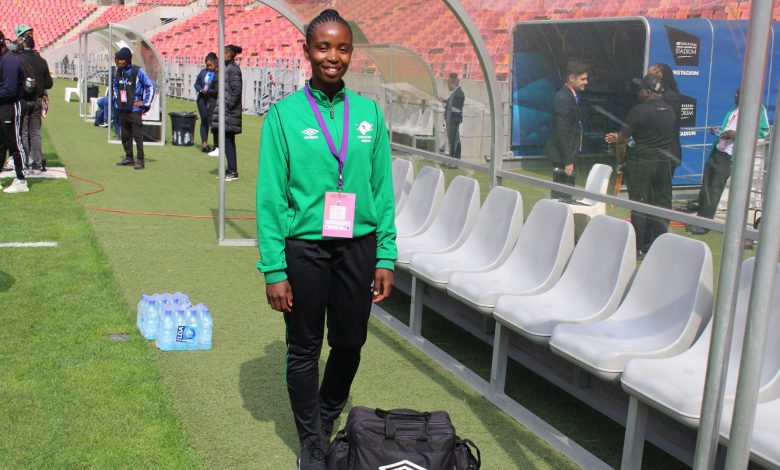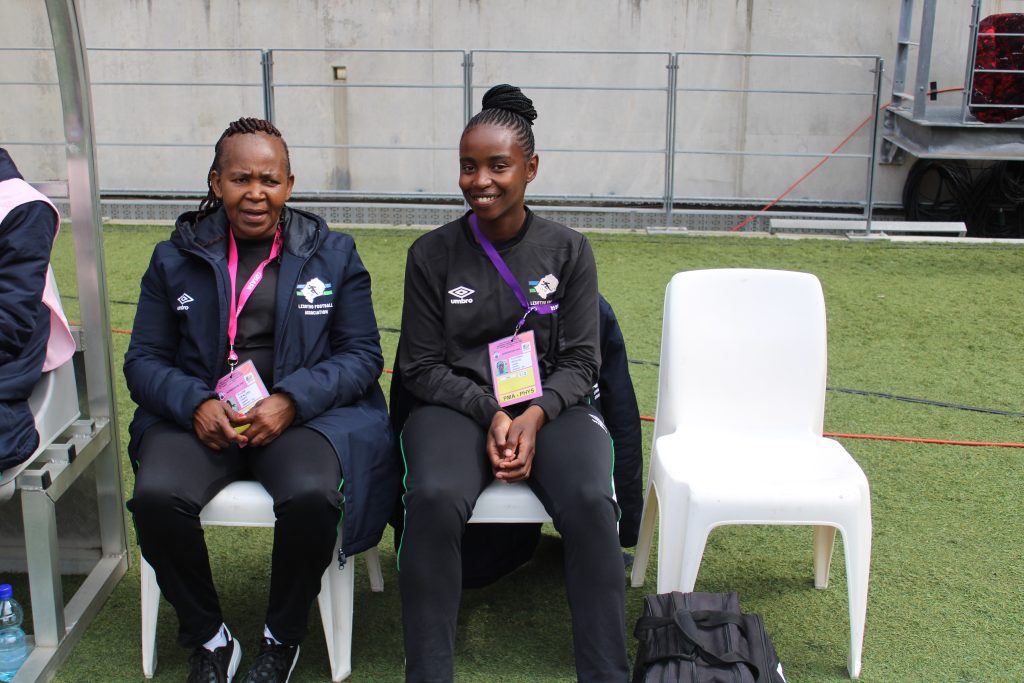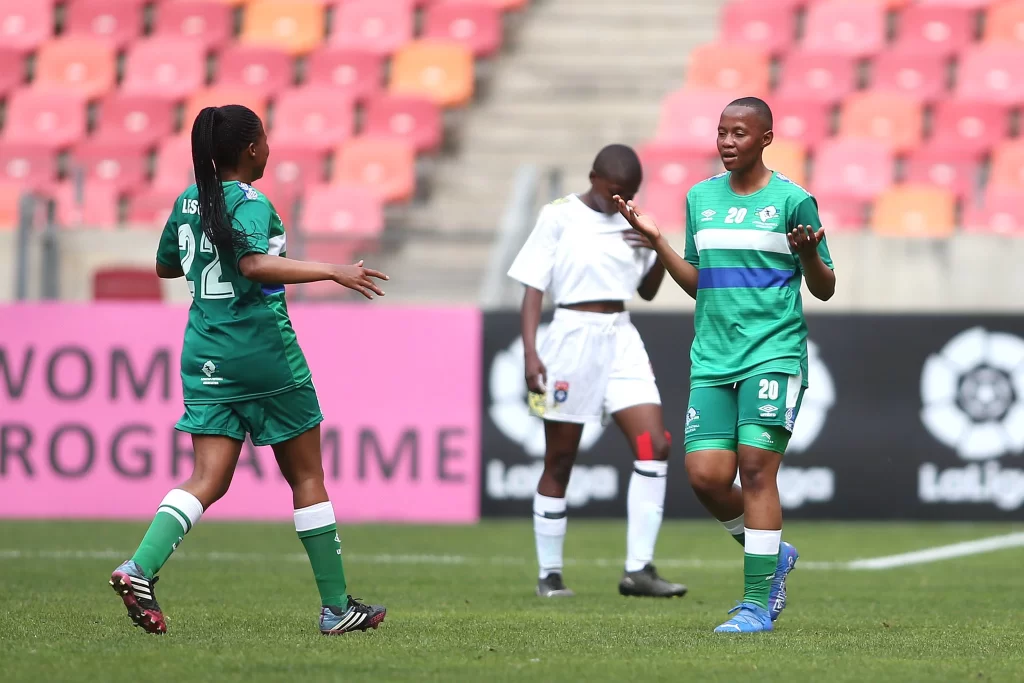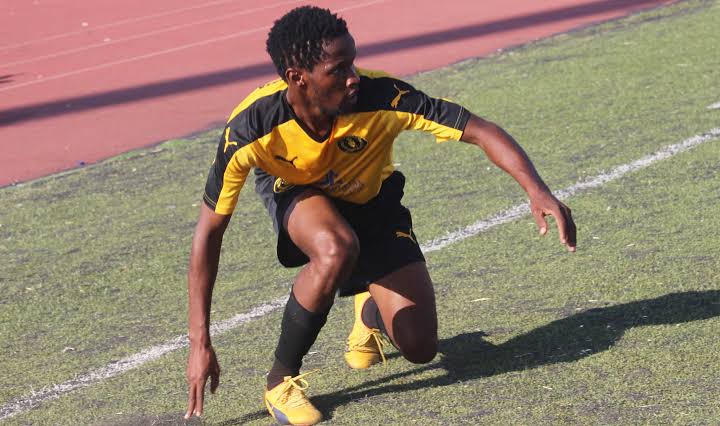Lesotho’s medic Refiloe Kolisang changing the game

When Refiloe Kolisang joined Matlama in 2020 as a paramedic, she became one of the few qualified paramedics working at Lesotho’s football clubs, writes Tlalane Phahla.
Since then, she has been a woman on a mission to change the landscape of sports medicine in the country by advocating for players’ welfare.
She insists it should be at the forefront, and everyone should play a part in ensuring players’ welfare is taken seriously.
RISKING PLAYERS’ CAREERS
It is not a secret that most clubs in the country use pseudo-medics who run around with water bottles and ice to attend to injuries at football grounds.
They fill positions to satisfy club licensing requirements while also risking players’ careers at the same time.

The danger of having untrained people is that the only thing they know is putting ice and may do it even when it’s not needed.
In some cases, ice and spray are all the club would have provided. The medical side of football is by far the most imperative. It deals with human well-being; the last thing needed is misdiagnosing injuries and putting players at greater risk. But why has it been ignored for so long?
Cold, harsh truth, teams cannot simply afford to hire professionals, save for only a handful of teams in the Vodacom Premier League.
Kolisang, who serves as a head medic for Matlama, understands the situation. That as it may, she believes the very same individuals could be trained and be given the basics of sports medicine so at least they have an idea of what to do when they attend to injuries.
UNQUALIFIED PEOPLE
“I think it is because of funds; they don’t want to hire people just for its sake. But they don’t have the means to hire qualified people and pay them.
“However, these people that don’t know maybe there is something they can do. There are basics we can teach them,” she said.
“We are still hoping that before the season goes far, we will hold the refresher course for all the physiotherapists from all levels to come and equip themselves. We need qualified people, but, in the meantime, what we can do is to help the ones that are already available,” she continued.
Unqualified people attending to players’ injuries could harm their careers and health.
A misdiagnose could end or prolong an injury. Kolisang does not only work with Matlama but recently came from the COSAFA Women Championships, where she served as team medic for Lesotho.

The experience and skills she continues to acquire daily are worth sharing with others in the game.
“I want everyone to understand the importance of putting player’s welfare at the forefront. I made Matlama aware that we need medical equipment to be ready should anything happen. That was successful,” she added.
DARKNESS AND HOPELESSNESS
It’s not just injuries; it’s about knowing the players thoroughly. What sickness do they have, and any allergies they may have?
Kolisang reveals that her main goal is to help the association have a medical department where players’ welfare is prioritised.
To have doctors working to a point where the football governing body can have a sports medicine centre.
This would help avoid taking players to a public hospital where they queue and be attended to after 10 hours by someone who knows nothing about sports medicine.
It is not always about money but about making a difference and making people aware, she says.
It’s not hard to see Kolisang’s point of view. In 2019, Bantu’s playmaker Lindokuhle Phungulwa suffered a knee injury during a game at Setsoto Stadium.
Bantu’s estimated he could be out for three months, as is usually the case with knee injuries, but three months turned into three years.
LONG INJURY LAYOFF
Three years of darkness and hopelessness, according to the player, Phungulwa doesn’t speak a lot about his injury ordeal to avoid going back into the hole that he describes as a nightmare.
He was misdiagnosed at a public hospital, he only became better when he was sent to Bloemfontein to get a second opinion, but the damage was already done. He only returned to action last month.
Perhaps this could have been avoided if there was a sports centre focused on sports injuries only.
Kolisang studied Emergency Medical Services. After completing school, she was in limbo, not knowing what to do. Paramedic jobs are scarce in the country. Unemployment became agonising. She had to find something to make a living.

She had to park her qualifications and find a job at Pick ‘n Pay; this is where she met people who encouraged her and connected her with some rugby clubs, which improved her career.
“It was in rugby where I realised I could use my knowledge and convert it to sports medicine.
“When I got into football, I didn’t know a lot, but I found people who guided me on what courses to take.
“I did a diploma in football medicine. Coach Thabo Senong helped me; I did the course and finished it from there; I was doing other short courses relating to football,” she added.
CALLED TO ACTION
Working with the women’s national teams and working for a big club sounds pleasant, but that isn’t always the case.
The job comes with its challenges, the main one being players who do not disclose their injuries or a coach demanding a player even though the medics have not cleared such player to return to action.
She says that at times, there is nothing they can do, and they keep quiet.
A player would just put a bandage on the swollen ankle and get on with it despite the risks of aggravation.
“I think we are not at the level where players understand that if you are injured, you go out, you don’t come in when you want to,” she said.
“Your physio or medic will be the one to say you can play, but sometimes we are deceived by our coaches, but there is nothing you can do.
FORTUNATE…
With all kinds of injuries in football, Kolisang considers herself fortunate that they have not experienced any life-threatening injuries like a concussion or cardiac arrest.
Although she thinks they are best equipped to deal with such if it was to occur.
She was, however, called into action last season when an opposition player suffered a concussion. Along with other medics, they could stabilise the player, but he could not continue the game. He did recover and is back playing football again.
“Even those tiny injuries, we have not found dangerous ones. For example, a player can pull a muscle and tear it, which would force him to stay at home for a long time.
“They have not been extreme. I think the way we are working with our coaches for prevention and to control those already have injuries through rehabilitation before they come back is working,” she continued.
It is mindboggling and baffling how such a key area of football has been grossly overlooked and ignored for so long, although Kolisang believes there is light at the end of the tunnel.